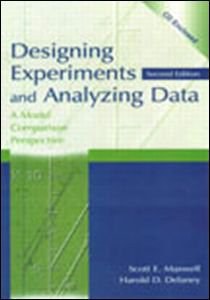

Through this book's unique model comparison approach, students and researchers are introduced to a set of fundamental principles for analyzing data. After seeing how these principles can be applied in simple designs, students are shown how these same principles also apply in more complicated designs. Drs. Maxwell and Delaney believe that the model comparison approach better prepares students to understand the logic behind a general strategy of data analysis appropriate for various designs; and builds a stronger foundation, which allows for the introduction of more complex topics omitted from other books. Several learning tools further strengthen the reader's understanding: *flowcharts assist in choosing the most appropriate technique; *an equation cross-referencing system aids in locating the initial, detailed definition and numerous summary equation tables assist readers in understanding differences between different methods for analyzing their data; *examples based on actual research in a variety of behavioral sciences help students see the applications of the material; *numerous exercises help develop a deeper understanding of the subject. Detailed solutions are provided for some of the exercises and *realistic data sets allow the reader to see an analysis of data from each design in its entirety. Updated throughout, the second edition features: *significantly increased attention to measures of effects, including confidence intervals, strength of association, and effect size estimation for complex and simple designs; *an increased use of statistical packages and the graphical presentation of data; *new chapters (15 & 16) on multilevel models; *the current controversies regarding statistical reasoning, such as the latest debates on hypothesis testing (ch. 2); *a new preview of the experimental designs covered in the book (ch. 2); *a CD with SPSS and SAS data sets for many of the text exercises, as well as tutorials reviewing basic statistics and regression; and *a Web site containing examples of SPSS and SAS syntax for analyzing many of the text exercises. Appropriate for advanced courses on experimental design or analysis, applied statistics, or analysis of variance taught in departments of psychology, education, statistics, business, and other social sciences, the book is also ideal for practicing researchers in these disciplines. A prerequisite of undergraduate statistics is assumed. An Instructor's Solutions Manual is available to those who adopt the book for classroom use.
具體描述
讀後感
用戶評價
Awesome!!!
评分Awesome!!!
评分Awesome!!!
评分Awesome!!!
评分Awesome!!!
相關圖書
本站所有內容均為互聯網搜索引擎提供的公開搜索信息,本站不存儲任何數據與內容,任何內容與數據均與本站無關,如有需要請聯繫相關搜索引擎包括但不限於百度,google,bing,sogou 等
© 2025 onlinetoolsland.com All Rights Reserved. 本本书屋 版权所有




















